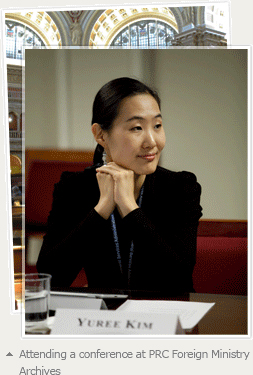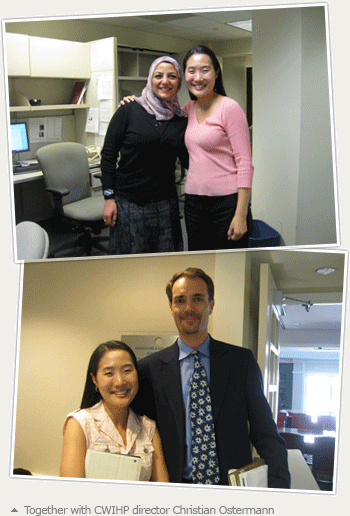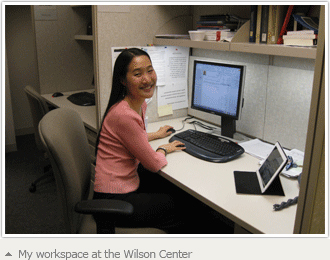I spent the past six months serving as an intern at the Woodrow Wilson International Center for Scholars in Washington, D.C., which provided me with a valuable opportunity to experience the many academic, political, and cultural events that the U.S. capital had to offer. As a short-term visiting researcher at the center, I was able to dedicate myself to conducting research related to my personal interests. The Woodrow Wilson Center gave me considerable inspiration through its excellent research system and resources as well as a diverse range of seminars and other activities that enabled me to spend time with people from various fields, thereby leaving me with truly unforgettable memories.
Political Scientist Transformed into Historian
 The Woodrow Wilson Center implements, among other notable programs, the Cold War International History Project (CWIHP), under which source materials collected from all around the world, including Eastern Europe, Russia, and China, are ed and published for research and academic purposes. In line with the project’s basic ives, researchers, mainly historians, explore and discover new facts and propose new perspectives based on their findings.
The Woodrow Wilson Center implements, among other notable programs, the Cold War International History Project (CWIHP), under which source materials collected from all around the world, including Eastern Europe, Russia, and China, are ed and published for research and academic purposes. In line with the project’s basic ives, researchers, mainly historians, explore and discover new facts and propose new perspectives based on their findings.
As an International Studies major, I am particularly interested in the current diplomatic landscape of East Asia. Hence, before my arrival at the WilsonCenter in January, I was somewhat worried that my research there would involve only historical materials. But, once I started my internship at the center, this turned out to be a needless worry. The neutrality of the center’s ation projects and its focus on historical developments d a perfect balance for the research tendency of Washington, which sensitively reacts to numerous current issues and events.
On my first day at the center, my supervisor, James Person, said he was sure that I would be captivated by the charm of history and historical materials, adding half jokingly that the place tends to “transform political scientists into historians.” The center boasts a wealth of s on diplomatic issues of significant value. With direct online access to the U.S. Library of Congress, which houses a huge volume of material, six months seemed absolutely adequate to go through all the relevant resources.
Assigned to work on the North Korea International ation Project (NKIDP), which is part of the CWIHP, I came to realize how superficial and fragmented my knowledge of North Korea was. Even though I had been studying international relations, with a focus on the East Asian region, my understanding was shallow and lacked detailed knowledge about historical backgrounds and previous research of various controversial topics. But, at the same time, I felt a sense of achievement as I was able to efficiently deepen my understanding of these areas during my brief period of time at the center. My work duties also included reviewing recent NKIDP translations and making necessary corrections. This was an extremely rewarding assignment since the NKIDP’s North Korea-related sources, whether published in traditional or electronic form, are widely cited by researchers around the world.
Broadened Perspective from Seminars
 My benefits from the internship were not simply about the time I spent within the center, where I received full support for my research and had access to precious diplomatic materials firsthand. I also enjoyed attending a wide variety of seminars held in the Washington area, where I was able to meet numerous people from different walks of life. Due to upcoming political changes in a number of countries this year, including presidential elections in Korea and the United States and leadership transitions in China and Taiwan, research institutes are scrambling to analyze or forecast future directions through organizing a series of seminars.
My benefits from the internship were not simply about the time I spent within the center, where I received full support for my research and had access to precious diplomatic materials firsthand. I also enjoyed attending a wide variety of seminars held in the Washington area, where I was able to meet numerous people from different walks of life. Due to upcoming political changes in a number of countries this year, including presidential elections in Korea and the United States and leadership transitions in China and Taiwan, research institutes are scrambling to analyze or forecast future directions through organizing a series of seminars.
There also were numerous seminars dealing with various other themes, including trade, finance, culture, women, and the environment. Since it was practically impossible to attend all of the gatherings that attracted my interest, I had to choose those which were most closely related to my research area. Between January and late May, I attended more than 50 seminars, including those on peace talks during the Vietnam War and the role of private foundations (like Ford and Carnegie) in the United States. This means that I attended seminars three times a week on average, visiting such notable host institutions as the Brookings Institution, Johns Hopkins School of Advanced International Studies, the Sigur Center for Asian Studies at George Washington University, and the Korea Economic Institute.
Whether called seminars, workshops, or conferences, these events often looked quite similar to one another. But each gathering provided a rare opportunity to obtain valuable information directly from leading experts in their respective fields at a place located within a 30-minute walking distance. Immediately after the elections in Taiwan and Iran earlier this year, scholars from these countries presented their analyses of the election outcomes. Various researchers sought to discuss pro-democracy movements in the Middle East and their impact, while others described the economic or political situations in Latin America or Africa.
By attending the seminars, I was able to gain insight into various aspects of U.S. foreign policy, beyond Korea-U.S. relations. I could see that most of the gatherings were organized from the viewpoints of U.S. national interests and thus dealt with major topics concerning certain countries or issues from Washington’s perspective. Therefore, it was all the more interesting for me to interpret the messages from my own perspective, filtered through the lens of a young female Korean researcher. From time to time I came across the same attendees with similar interests as myself, while at other times I engaged in discussions with complete strangers. I also noticed how private think tanks play lead roles in these gatherings, and felt envious of them.
Ideal Research Environment
 During my stay in Washington, D.C., I came to think about where South Korea stands in the world today. Whenever North Korea resorts to brinkmanship or provocative acts like missile launch or nuclear tests, the Korean Peninsula draws keen interest from the international community. But such attention does not last long, while China and the Middle East seem to attract more constant attention. The frequency and scale of seminars on country-specific themes suggest the level of interest among advanced countries.
During my stay in Washington, D.C., I came to think about where South Korea stands in the world today. Whenever North Korea resorts to brinkmanship or provocative acts like missile launch or nuclear tests, the Korean Peninsula draws keen interest from the international community. But such attention does not last long, while China and the Middle East seem to attract more constant attention. The frequency and scale of seminars on country-specific themes suggest the level of interest among advanced countries.
Ironically, I felt little need to “promote” South Korea, thanks in large part to North Korea. Regardless of the particular theme at any seminar, everybody had a certain level of understanding of Korea. Korea-related seminars took place more often than those on Japan or Taiwan, and also attracted more participants. Attendees shared their opinions on South Korea’s economic development, democratization, and its current policies. As a diversion, I participated as a member of the Choral Arts Society of Washington, where I didn’t need to explain to the other members about Korea, either.
Although I was born and grew up in South Korea and had never studied abroad, I thought I had managed to somewhat widen my perspectives through travel and by exposing myself to a variety of experiences. But my internship at the Woodrow Wilson Center and six-month stay in Washington, D.C. added a notable depth and diversity to my experiences. Even today, while writing this article, I am sitting next to Joumana, a Syrian lawyer, to my right, who has to keep worrying about violence in his country, and to my left is Raghda from Palestine, who has actively participated in seminars to spark interest in the volatile situation of the Gaza Strip. Both scheduled to return home this weekend, they are anxious about the future of their respective country. In my opinion, among the numerous research institutes in the U.S. capital, the Woodrow Wilson Center seems to offer the best research environment. It is politically neutral, and many of its projects, like NKIDP, are carried out from a long-term perspective. Its staff consists of researchers from all around the world.
Last but not least, I would like to mention the city itself. Since President Obama’s endorsement of gay marriage, the city has been in a festive mood with shops welcoming the decision with rainbow stickers on their entrance doors. On weekends, DuPont Circle in my neighborhood is packed with male customers coming around to have brunch. All these aspects show the diversity of Washington, D.C., home to numerous national monuments and museums. I will long remember the diversity and vibrancy of this wonderful city.
Yuree Kim
Ph.D. Candidate
Graduate School of International Studies
Seoul National University
 한국국제교류재단
한국국제교류재단












